To maximise the impact of any new stimulus package, Beijing should be ready to spend bigger than the 4 trillion yuan (US$564.7 billion) rolled out after the 2008 financial crisis – but the long-term consequences of that previous response, said outspoken economist Yu Yongding, should remind policymakers to think and act carefully.
Advertisement
For the best chance to re-energise the country’s economy in one fell swoop, the former adviser to the People’s Bank of China said in an exclusive interview, the government should quantify its stimulus plan as soon as possible – ideally with a detailed timetable.
“With only three months left in the year, rushing into battle may have serious side effects,” Yu said. “If it’s too late this year, we can continue next year. Actions cannot be rushed, but the release of policy signals cannot be delayed.”
The world’s second-largest economy had displayed a reluctance to unleash an all-out stimulus over the past decade, despite multiple trying moments.
The measures from late 2008 are now thought to have brought a new set of persistent problems, including industrial overcapacity, extensive debt burdens on local governments, an overreliance on the property market and rampant risk in the financial system.
Advertisement
But a shift in direction has been observed since last month. Most notably, the Politburo – a major decision-making body of the Communist Party – convened an unexpected meeting on September 26, where President Xi Jinping exhorted officials across the nation to prioritise economic revival and help achieve the country’s annual growth target of “around 5 per cent”.

